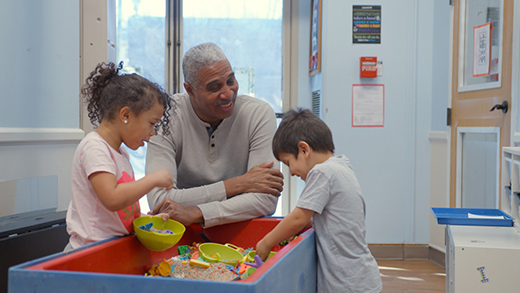College of Education produces documentary about child trauma and resiliency
Thursday, Feb. 17, 2022

Rudy Liggins, center, a retired teacher, works with two students at The Children's Place in Kansas City, Missouri, in the new Kansas State University College of Education documentary "Becoming Trauma Responsive," which explores the effects of childhood trauma on learning, behavior and more. | Download this photo.
MANHATTAN — A new documentary produced by the Kansas State University College of Education explores the effects of childhood trauma on learning, behavior and developing relationships.
"Becoming Trauma Responsive" will premiere on Kansas and Missouri PBS stations KCPT, KTWU and SHPTV at 8 p.m. Monday, Feb. 21. The documentary highlights the work of trauma experts and educators in the Kansas City metro, Wichita, Topeka and Coffeyville, and school counseling faculty with the College of Education. The documentary is available for free on the College of Education's website for educators, counselors, caregivers and anyone interested in becoming trauma-informed.
The documentary delves into the effects of childhood trauma on learning, behavior and the ability to develop relationships. Additional partners in the film are The Children's Place in Kansas City, Missouri; Foster Adopt Connect, serving foster families in Kansas and Missouri; and Topeka Public Schools.
Throughout the course of the COVID-19 pandemic, schools across the country reported increases in depression and general anxiety in both students and educators. The pressure strained schools' abilities to meet the social and emotional needs of students. For students affected by trauma and dependent on school services, the elevated stress and uncertainty intensified already difficult situations.
"For years, educators have sought out resources to become more trauma-equipped, but the pandemic has truly awakened the need for immediate support," said Debbie Mercer, dean of the College of Education. "Our sincerest hope is that this documentary — and the voices of professionals, some of whom are survivors of trauma themselves — provides direction for educators and caregivers as well as inspiring others to become teachers and school counselors."
"Becoming Trauma Responsive" details the changes two schools in Kansas and a preschool in Missouri made to meet the social and emotional needs of their students and staff. Their techniques were substantiated by trauma experts who've spent decades in counseling, therapy and neuroscience. Research has indicated that the cognitive skills needed for resiliency are learned.
"Investing in mental health is an investment in healthy communities," said Tiffany Anderson, superintendent of USD 501, the Topeka Public Schools. "We recognize that in order to truly support our mission ... a priority on trauma-informed practices was critical and our focus on social-emotional health has improved the lives of countless families across Topeka."
Nathan Ross' personal story offers compelling evidence of the research results. Ross, formerly known as Ronald Bass, was one of five children abused at the hands of their mother who suffered from severe psychosis. The family included a set of triplet boys, two of whom died because of the extreme abuse. The 1999 Bass case has remained one of the most shocking in Missouri state history.
Ross learned to channel his experiences and focused his attention on helping kids in foster care and those in adoptive homes. His message in the film provides a unique vantage point of how to help kids, even when the specific cause of the trauma is unknown.
Other topics addressed in the film include teaching self-regulation, identifying the stress response system, creating an environment that helps students overcome stress, developing a tolerance for change, and establishing self-care routines for educators and caregivers.
